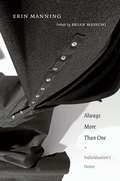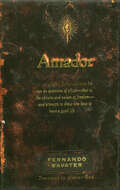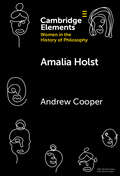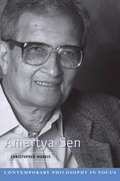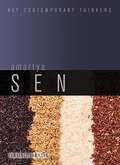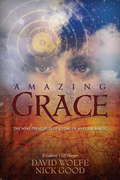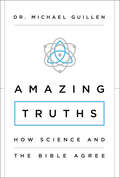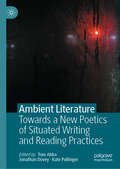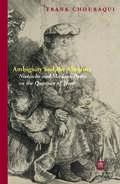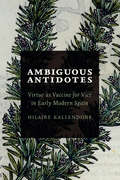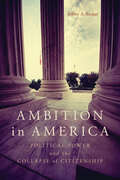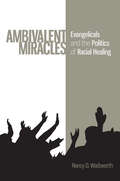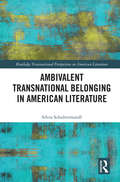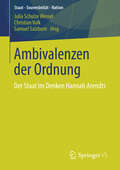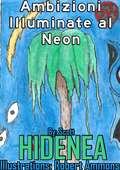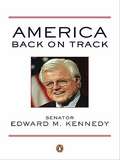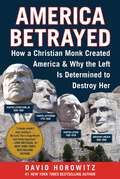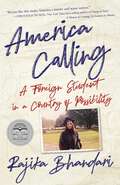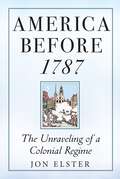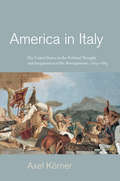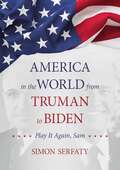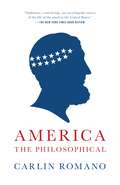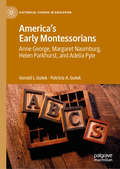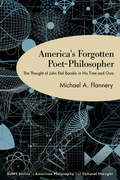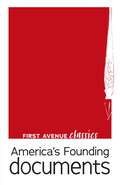- Table View
- List View
Always More Than One: Individuation's Dance
by Erin ManningIn Always More Than One, the philosopher, visual artist, and dancer Erin Manning explores the concept of the "more than human" in the context of movement, perception, and experience. Working from Whitehead's process philosophy and Simondon's theory of individuation, she extends the concepts of movement and relation developed in her earlier work toward the notion of "choreographic thinking." Here, she uses choreographic thinking to explore a mode of perception prior to the settling of experience into established categories. Manning connects this to the concept of "autistic perception," described by autistics as the awareness of a relational field prior to the so-called neurotypical tendency to "chunk" experience into predetermined subjects and objects. Autistics explain that, rather than immediately distinguishing objects—such as chairs and tables and humans—from one another on entering a given environment, they experience the environment as gradually taking form. Manning maintains that this mode of awareness underlies all perception. What we perceive is never first a subject or an object, but an ecology. From this vantage point, she proposes that we consider an ecological politics where movement and relation take precedence over predefined categories, such as the neurotypical and the neurodiverse, or the human and the nonhuman. What would it mean to embrace an ecological politics of collective individuation?
Amador: A Father Talks To His Son About Happiness, Freedom, And Love
by Fernando SavaterIn a series of letters to his son, the renowned Spanish philosopher delivers sage advice on living an ethical life in today’s world.One of Europe’s foremost ethicists, Fernando Savater presents a deeply personal inquiry into the art of living well—one addressed to his own teenage son, Amador. In a series of personal letters, Savater encourages his son to recognize his own agency and use it responsibly, to think freely, and to make decisions that are both well-reasoned and empathetic. Amador is a heartfelt and enlightening primer for modern life, and an inspiration for any parent wishing to impart wisdom to their children.
Amalia Holst (Elements on Women in the History of Philosophy)
by Andrew CooperAmalia Holst's trailblazing book On the Vocation of Woman to Higher Intellectual Education (1802) dropped a bomb on the German speaking states-a bomb that failed to detonate. In one of the first works of philosophy in German published under a woman's name, Holst declares that it is time a member of the female sex spoke out about the plight of women in Germany. Despite her bold attempt to ignite a new movement of women's education, her book was harshly reviewed by male critics and thrust into obscurity. This Element presents the first comprehensive study of Holst's writings, unearthing their striking contribution to philosophy's growing awareness of the social conditions of human freedom. The force of her argument, and the difficulties she encountered, reveal the ambiguous character of the German Enlightenment and prompt us to reconsider what can be salvaged from it.
Amartya Sen
by Christopher W. MorrisAmartya Sen was awarded the Nobel Memorial Prize in Economics in 1998 "for his contributions in welfare economics." Although his primary academic appointments have been mostly in economics, Sen is also an important and influential social theorist and philosopher. His work on social choice theory is seminal, and his writings on poverty, famine, and development, as well his contributions to moral and political philosophy, are important and influential. Sen's views about the nature and primacy of liberty also make him a major contemporary liberal thinker. This volume of essays on aspects of Sen's work is aimed at a broad audience of readers interested in social theory, political philosophy, ethics, public policy, welfare economics, the theory of rational choice, poverty, and development. Written by a team of well-known experts, each chapter provides an overview of Sen's work in a particular area and a critical assessment of his contributions to the field.
Amartya Sen (Key Contemporary Thinkers)
by Lawrence HamiltonAmartya Sen is one of the world’s best-known voices for the poor, the destitute and the downtrodden and an inspiration for policy makers and activists across the globe. He has also contributed almost without peer to the study of economics, philosophy and politics, transforming social choice theory, development economics, ethics, political philosophy and Indian political economy, to list but a few. <P><P> This book offers a much-needed introduction to Amartya Sen’s extraordinary variety of ideas. Lawrence Hamilton provides an excellent, accessible guide to the full range of Sen’s writings, contextualizing his ideas and summarizing the associated debates. In elegant prose, Hamilton reconstructs Sen’s critiques of the major philosophies of his time, assesses his now famous concern for capabilities as an alternative for thinking about poverty, inequality, gender discrimination, development, democracy and justice, and unearths some overlooked gems. Throughout, these major theoretical and philosophical achievements are subjected to rigorous scrutiny.
Amazing Grace: The Nine Principles of Living in Natural Magic
by David Wolfe Nick GoodIt’s official; embraced by everyone from stars like Uma Thurman and Woody Harrelson to average people who are seeking the best health possible, raw food and the live food lifestyle is “in. ” But making that transition can be a challenge. That’s whereAmazing Gracecomes in. Written by raw-foods authority David Wolfe with life coach Nick Good, this combination of personal story and motivational guide offers a wealth of ways to improve life, health, and spirit by adopting this nurturing, intuitive lifestyle. Amazing Graceshares Wolfe’s secrets on how to become a superhero and lead a life full of fun, synchronicity, and magic. These secrets are based both on the personal experiences of the authors and the seven principles of Huna, the ancient Hawaiian shamanic tradition. With the addition of Grace and Forgiveness, they comprise nine powerful principles for success. Equally useful whether reading cover to cover, sampling for nuggets of wisdom and inspiration, or retaining as a reference for support and guidance,Amazing Graceshows readers how to experience a new yet basic paradigm of possibility in an increasingly complex and confusing world.
Amazing Truths: How Science and the Bible Agree
by Michael GuillenDoes science discredit the Bible, God, religious faith?Absolutely not, says Dr. Michael Guillen, former Harvard physics instructor and Emmy-winning ABC News Science Editor. In Amazing Truths, he uses his entertaining, down-to-earth storytelling skills to reveal ten astonishing truths affirmed by both ancient Scripture and modern science that answer some of our biggest questions:Can faith really move mountains?Does absolute truth exist?Are humans truly unique?Is it possible to communicate with God?How much about the universe do we actually know?How could Jesus have been fully man and fully God?In Amazing Truths, Dr. Guillen explains that faith is not some outdated way of thinking. Faith is a necessary part of science, Christianity, and any intelligent, comprehensive, coherent worldview--vastly more powerful than even logic.Amazing Truths will expand your mind and bolster your faith. You will see for yourself what Dr. Guillen, a theoretical physicist and devout Christian, has discovered in a lifetime of serious exploration--that science and faith are not at odds. In fact, they're the ultimate power couple.
Ambient Literature: Towards a New Poetics of Situated Writing and Reading Practices
by Kate Pullinger Tom Abba Jonathan DoveyThis book considers how a combination of place-based writing and location responsive technologies produce new kinds of literary experiences. Building on the work done in the Ambient Literature Project (2016–2018), this books argues that these encounters constitute new literary forms, in which the authored text lies at the heart of an embodied and mediated experience. The visual, sonic, social and historic resources of place become the elements of a live and emergent mise-en-scène. Specific techniques of narration, including hallucination, memory, history, place based writing, and drama, as well as reworking of traditional storytelling forms combine with the work of app and user experience design, interaction, software authoring, and GIS (geographical information systems) to produce ambient experiences where the user reads a textual and sonic literary space. These experiences are temporary, ambiguous, and unpredictable in their meaning but unlike the theatre, the gallery, or the cinema they take place in the everyday shared world. The book explores the potentiality of a new literary form produced by the exchange between location-aware cultural objects, writers and readers. This book, and the work it explores, lays the ground for a new poetics of situated writing and reading practices.
Ambiguity and the Absolute: Nietzsche and Merleau-Ponty on the Question of Truth (Perspectives in Continental Philosophy)
by Frank ChouraquiFriedrich Nietzsche and Maurice Merleau-Ponty, Chouraqui argues, are linked by how they conceive the question of truth. Although both thinkers criticize the traditional concept of truth as objectivity, they both find that rejecting it does not solve the problem. What is it in our natural existence that gave rise to the notion of truth?The answer to that question is threefold. First, Nietzsche and Merleau-Ponty both propose a genealogy of “truth” in which to exist means to make implicit truth claims. Second, both seek to recover the preobjective ground from which truth as an erroneous concept arose. Finally, this attempt at recovery leads both thinkers to ontological considerations regarding how we must conceive of a being whose structure allows for the existence of the belief in truth. In conclusion, Chouraqui suggests that both thinkers’ investigations of the question of truth lead them to conceive of being as the process of self-falsification by which indeterminate being presents itself as determinate.
Ambiguous Antidotes: Virtue as Vaccine for Vice in Early Modern Spain
by Hilaire KallendorfChastity and lust, charity and greed, humility and pride, are but some of the virtues and vices that have been in tension since Prudentius’ Psychomachia, written in the fifth century. While there has been widespread agreement within a given culture about what exactly constitutes a virtue or a vice, are these categories so consistent after all? In Ambiguous Antidotes, Hilaire Kallendorf explores the receptions of Virtues in the realm of moral philosophy and the artistic production it influenced during the Spanish Gold Age. Using the Derridian notion of pharmakon, a powerful substance that can serve as poison and cure, Kallendorf’s original and pioneering insight into five key Virtues (justice, fortitude, chastity, charity, and prudence) reveals an intriguing but messy relationship. Rather than being seen as unambiguously good antidotes, the Virtues are instead contested spaces where competing sets of values jostled for primacy and hegemony. Employing an arsenal of tools drawn from literary theory and cultural studies Ambiguous Antidotes confirms that you can in fact have too much of a good thing.
Ambition in America: Political Power and the Collapse of Citizenship
by Jeffrey A. BeckerMost Americans admire the determination and drive of artists, athletes, and CEOs, but they seem to despise similar ambition in their elected officials. The structure of political representation and the separation of powers detailed in the United States Co
Ambivalent Miracles: Evangelicals and the Politics of Racial Healing (Race, Ethnicity, and Politics)
by Nancy D. WadsworthOver the past three decades, American evangelical Christians have undergone unexpected, progressive shifts in the area of race relations, culminating in a national movement that advocates racial integration and equality in evangelical communities. The movement, which seeks to build cross-racial relationships among evangelicals, has meant challenging well-established paradigms of church growth that built many megachurch empires. While evangelical racial change (ERC) efforts have never been easy and their reception has been mixed, they have produced meaningful transformation in religious communities. Although the movement as a whole encompasses a broad range of political views, many participants are interested in addressing race-related political issues that impact their members, such as immigration, law enforcement, and public education policy. Ambivalent Miracles traces the rise and ongoing evolution of evangelical racial change efforts within the historical, political, and cultural contexts that have shaped them. Nancy D. Wadsworth argues that the stunning breakthroughs this movement has achieved, its curious political ambivalence, and its internal tensions are products of a complex cultural politics constructed at the intersection of U.S. racial and religious history and the meaning-making practices of conservative evangelicalism. Employing methods from the emerging field of political ethnography, Wadsworth draws from a decade’s worth of interviews and participant observation in ERC settings, textual analysis, and survey research, as well as a three-year case study, to provide the first exhaustive treatment of ERC efforts in political science. A 2014 CHOICE Outstanding Academic Title
Ambivalent Transnational Belonging in American Literature (Routledge Transnational Perspectives on American Literature)
by Silvia SchultermandlAmbivalent Transnational Belonging in American Literature discusses the extent to which transnational concepts of identity and community are cast within nationalist frameworks. It analyzes how the different narrative perspectives in texts by Olaudah Equiano, Catharina Maria Sedgwick, Henry James, Jamaica Kincaid, and Mohsin Hamid shape protagonists’ complex transnational subjectivities, which exist between or outside national frameworks but are nevertheless interpellated through the nation-state and through particular myths about liberal, sentimental, or cosmopolitan subjects. The notion of ambivalent transnational belonging yields insights into the affective appeal of the transnational as a category of analysis, as an aesthetic experience, and as an idea of belonging. This means bringing the transnational into conversation with the aesthetic and the affective so we may fully address the new conceptual challenges faced by literary studies due to the transnational turn in American studies.
Ambivalenzen der Ordnung: Der Staat im Denken Hannah Arendts (Staat – Souveränität – Nation)
by Samuel Salzborn Julia Schulze Wessel Christian VolkEs besteht kein Zweifel, dass Hannah Arendt den klassischen republikanischen Tugenden des bürgerschaftlichen Engagements, der Partizipation und des politischen Handelns in ihrem Werk eine gewichtige Bedeutung verliehen hat. Ihr politisches Denken lebt von öffnenden Begriffen wie der Natalität, dem Anfang, der Pluralität, der Spontaneität oder der Freiheit des Menschen, etwas beginnen zu können. Und dennoch ist dieses Denken nur ein Teil von ihr und steht in einer konzeptionellen Beziehung zu einem dezidierten Ordnungsdenken, das in der Forschung bislang vernachlässigt wurde. Dieses stärker in den Mittelpunkt der Auseinandersetzung zu rücken, ist das Anliegen dieses Bandes.
Ambizioni Illuminate al Neon
by Scott Hidenea Riccardo41 poesie ed illustrazioni derivate da esperienze di vita ricorrenti, innate in questo mondo moderno. Una combinazione sia di ispirazioni dirette che indirette mescolate con motivi fluorescenti illuminati
America Back on Track
by Senator Edward M. KennedyFrom one of America's most respected progressive voices comes an inspiring vision of reform and renewal In a Senate career spanning more than four decades, Edward M. Kennedy has become one of the most authoritative voices in American politics. His first major book in more than twenty years, America Back on Track argues that our nation has departed more deeply from its fundamental ideals than at any time in modern history. From a dangerous foreign policy to the threats against constitutional checks and balances, Kennedy tackles the country's gravest concerns and charts a course toward a stronger, freer, and fairer America. A provocative call to action, this will be read by everyone seeking political clarity in these tumultuous times.
America Betrayed: How a Christian Monk Created America & Why the Left Is Determined to Destroy Her
by David HorowitzAmerica is now engulfed in a crisis that goes to the very foundations of its democracy. To destroy Americans&’ pride in their heritage and undermine their will to defend it, the attacks on America&’s heritage begin with malicious slanders intended to turn the American dream of equality and freedom into a &“white supremacist&” nightmare. We are told America, from its inception, has been a &“racist&” nation that treats minorities as less than human. We are told America deserves to be destroyed. This destructive lie is now the official doctrine of the Biden White House, the &“woke&” Pentagon, the Democratic Senate, and the curricula of American schools. America Betrayed restores the true history of America&’s achievements and its role as a beacon of freedom. Framed by an account of Martin Luther&’s history and ideas, David Horowitz demonstrates that racial progress in America originates not from Leftist policy but from its founding ideals. America Betrayed is a history and a manifesto focused on the current war to save our country and restore the dignity and freedom of the individual.
America Calling: A Foreign Student in a Country of Possibility
by Rajika BhandariGrowing up in middle-class India, Rajika Bhandari has seen generations of her family look westward, where an American education means status and success. But she resists the lure of America because those who left never return—they all become flies trapped in honey in a land of opportunity. As a young woman, however, she finds herself heading to a US university to study, following her heart and a relationship. When that relationship ends and she fails in her attempt to move back to India as a foreign-educated woman, she returns to the US and finds herself in a job where the personal is political and professional: she is immersed in the lives of international students who come to America from over 200 countries, the universities that attract them, and the tangled web of immigration that a student must navigate. An unflinching and insightful narrative that explores the global appeal of a Made in America education that is a bridge to America’s successful past and to its future, America Calling is both a deeply personal story of Bhandari’s search for her place and voice, and an incisive analysis of America’s relationship with the rest of the world through the most powerful tool of diplomacy: education. At a time of growing nationalism, a turning inward, and fear of the “other,” America Calling is ultimately a call to action to keep America’s borders—and minds—open.
America before 1787: The Unraveling of a Colonial Regime
by Jon ElsterAn original account, drawing on both history and social science, of the causes and consequences of the American RevolutionWith America before 1787, Jon Elster offers the second volume of a projected trilogy that examines the emergence of constitutional politics in France and America. Here, he explores the increasingly uneasy relations between Britain and its American colonies and the social movements through which the thirteen colonies overcame their seemingly deep internal antagonisms.Elster documents the importance of the radical uncertainty about their opponents that characterized both British and American elites and reveals the often neglected force of enthusiasm, and of emotions more generally, in shaping beliefs and in motivating actions. He provides the first detailed examinations of &“divide and rule&” as a strategy used on both sides of the Atlantic and of the rise and fall of collective action movements among the Americans. Elster also explains how the gradual undermining in America of the British imperial system took its toll on transatlantic relations and describes how state governments and the American Confederation made crucial institutional decisions that informed and constrained the making of the Constitution.Drawing on a wide range of historical sources and on theories of modern social science, Elster brings together two fields of scholarship in innovative and original ways. The result is a unique synthesis that yields new insights into some of the most important events in modern history.
America in Italy: The United States in the Political Thought and Imagination of the Risorgimento, 1763-1865
by Axel KörnerAmerica in Italy examines the influence of the American political experience on the imagination of Italian political thinkers between the late eighteenth century and the unification of Italy in the 1860s. Axel Körner shows how Italian political thought was shaped by debates about the American Revolution and the U.S. Constitution, but he focuses on the important distinction that while European interest in developments across the Atlantic was keen, this attention was not blind admiration. Rather, America became a sounding board for the critical assessment of societal changes at home.Many Italians did not think the United States had lessons to teach them and often concluded that life across the Atlantic was not just different but in many respects also objectionable. In America, utopia and dystopia seemed to live side by side, and Italian references to the United States were frequently in support of progressive or reactionary causes. Political thinkers including Cesare Balbo, Carlo Cattaneo, Giuseppe Mazzini, and Antonio Rosmini used the United States to shed light on the course of their nation's political resurgence. Concepts from Montesquieu, Rousseau, and Vico served to evaluate what Italians discovered about America. Ideas about American "domestic manners" were reflected and conveyed through works of ballet, literature, opera, and satire.Transcending boundaries between intellectual and cultural history, America in Italy is the first book-length examination of the influence of America's political formation on modern Italian political thought.
America in the World from Truman to Biden: Play it Again, Sam
by Simon SerfatyDoes America still count in the world? Can the world still count on America? In raising such questions halfway into a series of systemic shocks that began in September 2001, Simon Serfaty, a long-time scholar of international politics, reminds Americans that their country’s well-being and that of the world are intertwined. Play it again, Sam: History is in a foul mood again, and this is no time to come home and leave behind an unfinished European Union facing the ghosts of a revanchist Russia still claiming the Old World as its own; a strategic dark hole in the Greater Middle East, on the eve of a global Sarajevo moment; and China’s surging hegemonic power in a continent fraught with too much history and too little geography. Admittedly, what is good for America may no longer be best for all the West, and what is good for the West may no longer be good for much of the Rest: the unipolar moment is irreversibly over. Yet, writing in an elegant style and with much historical insight, Serfaty argues that even with the old power map irreversibly gone, mainly to the benefit of the non-Western world, a new world order for the twenty-first century will remain dependent on the U.S. role, its capabilities and its efficacy, as well as its leadership and its purpose.
America the Philosophical
by Carlin RomanoA bold, insightful book that rejects the myth of America the Unphilosophical, arguing that America today towers as the most philosophical culture in the history of the world, an unprecedented marketplace of truth and argument that far surpasses ancient Greece or any other place one can name. With verve and keen intelligence, Carlin Romano--Pulitzer Prize finalist, award-winning book critic, and professor of philosophy--takes on the widely held belief that ours is an anti-intellectual society. Instead, while providing a richly reported overview of American thought, Romano argues that ordinary Americans see through phony philosophical justifications faster than anyone else, and that the best of our thinkers abandon artificial academic debates for fresh intellectual enterprises, such as cyberphilosophy. Along the way, Romano seeks to topple philosophy's most fiercely admired hero, Socrates, asserting that it is Isocrates, the nearly forgotten Greek philosopher who rejected certainty, whom Americans should honor as their intellectual ancestor. America the Philosophical introduces readers to a nation whose existence most still doubt: a dynamic, deeply stimulating network of people and places drawn together by shared excitement about ideas. From the annual conference of the American Philosophical Association, where scholars tack wiseguy notes addressed to Spinoza on a public bulletin board, to the eruption of philosophy blogs where participants discuss everything from pedagogy to the philosophy of science to the nature of agency and free will, Romano reveals a world where public debate and intellectual engagement never stop. And readers meet the men and women whose ideas have helped shape American life over the previous few centuries, from well-known historical figures like William James and Ralph Waldo Emerson, to modern cultural critics who deserve to be seen as thinkers (Kenneth Burke, Edward Said), to the iconoclastic African American, women, Native American, and gay mavericks (Cornel West, Susan Sontag, Anne Waters, Richard Mohr) who have broadened the boundaries of American philosophy. Smart and provocative, America the Philosophical is a rebellious tour de force that both celebrates our country's unparalleled intellectual energy and promises to bury some of our most hidebound cultural clichés.
America's Early Montessorians: Anne George, Margaret Naumburg, Helen Parkhurst and Adelia Pyle (Historical Studies in Education)
by Gerald L. Gutek Patricia A. GutekThis book traces the early history of the Montessori movement in the United States through the lives and careers of four key American women: Anne George, Margaret Naumburg, Helen Parkhurst, and Adelia Pyle. Caught up in the Montessori craze sweeping the United States in the Progressive era, each played a significant role in the initial transference of Montessori education to America and its implementation from 1910 to 1920. Despite the continuing international recognition of Maria Montessori and the presence of Montessori schools world-wide, Montessori receives only cursory mention in the history of education, especially by recognized historians in the field and in courses in professional education and teacher preparation. The authors, in seeking to fill this historical void, integrate institutional history with analysis of the interplay and tensions between these four women to tell this educational story in an interesting—and often dramatic—way.
America's Forgotten Poet-Philosopher: The Thought of John Elof Boodin in His Time and Ours (SUNY series in American Philosophy and Cultural Thought)
by Michael A. FlanneryThis book examines the ideas and influences of a nearly forgotten Swedish-American philosopher, John Elof Boodin (1869–1950). A friend and student of William James and protégé of Josiah Royce at Harvard, Boodin combined Jamesian pragmatism and Roycean idealism in developing original scholarship (nearly sixty articles and eight books) from 1900 to 1947, in addition to a volume of posthumous papers published in 1957. Although he is seldom remembered today, the enduring importance of pragmatism and the rising influence of process theology today suggests that his close reading of early to mid-twentieth-century science and vast grasp of philosophical issues warrants a renewed interest in his work that can be a valuable antidote to the sterile and constricting effects of reductionism and dogmatic materialism prevalent today in both those fields.
America's Founding Documents: The Declaration of Independence, the Articles of Confederation, the United States Constitution, the Federalist Papers, and the Bill of Rights (First Avenue Classics ™)
by Alexander Hamilton James Madison John Jay Thomas JeffersonSoon after the start of the American Revolutionary War in 1775, the Thirteen Colonies proclaimed their independence from British rule and became the United States of America. The written word proved vital in shaping America's new identity, laying the groundwork for societal principles and political doctrine alike. From Thomas Jefferson and the members of the Second Continental Congress, to Alexander Hamilton, James Madison, and John Jay, the authors of these documents had a profound and lasting effect on United States history. This collection includes unabridged versions of five famous and influential documents that helped to found a nation: the Declaration of Independence (1776), the Articles of Confederation (1777), the United States Constitution (1787), the Federalist Papers (1787–1788), and the Bill of Rights (1791).
